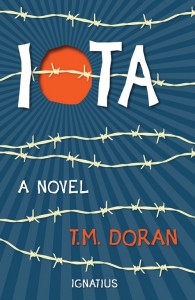This review originally appeared in Ignatius Novels author Roger B. Thomas’s personal blog, A Prince of the West (post here). Reprinted in full with permission.
I’ve heard it said that if the world made sense, men would ride sidesaddle. I’m going to up that by claiming that if the world made sense, artists like Tom Doran would be able to quit their day jobs and devote all their time to enriching our literary heritage by writing stories. The world needs more full-time authors like Doran and fewer like—well, like the ones we tend to get.
Besides, if he was writing full time, he might get around to penning a book in a genre I typically enjoy.
Doran’s first effort, Toward the Gleam, was a thriller involving prominent historical characters. It was a solid first effort, and I enjoyed it. I enjoyed even more his second work, Terrapin, which is a mystery—not what I usually choose to read, but I enjoy a well-written one, and Terrapin was certainly that.
 Doran’s newest work, Iota, is another type of story—a gritty wartime prisoner drama. I’ve seen stories like this, and am not sure if they’re prevalent enough to constitute a genre of their own, but they’re not my first choice for reading. However, because Tom Doran is a friend, I decided I’d plunge in anyway.
Doran’s newest work, Iota, is another type of story—a gritty wartime prisoner drama. I’ve seen stories like this, and am not sure if they’re prevalent enough to constitute a genre of their own, but they’re not my first choice for reading. However, because Tom Doran is a friend, I decided I’d plunge in anyway.
I’m very glad I did, if only to experience Doran’s increasingly polished writing. Experienced readers will know what I mean when I speak of a story that’s so smooth you don’t even realize you’re reading—you’re just carried along with the story as if you were inside it, living it out. Doran has reached this stage with Iota. Any rough edges (authors know what I mean) are almost unnoticeable and the plot flows smoothly. Nothing seems forced, and the characters do what they do because they are who they are, not because something or other needs to happen in the plot at this point. As a novel, it is a superior work.
The story itself rotates around Jan Skala, a Czech journalist who is arrested by the Soviets toward the end of WWII and imprisoned in a makeshift prison, a set of open cages set up on the floor of an abandoned abattoir (slaughterhouse). The cages are occupied by a variety of people who’ve been put there to be managed by the major, who wants something from each of them. Just what that something is remains clouded for each of the prisoners, though there is plenty of speculation. There is no privacy among the cages—everything about the prisoner’s lives is in the open. Part of the major’s strategy for dealing with them is to strip them of all humanity, reducing them to the level of beasts—beasts that would even devour each other. The main tension of the story revolves around the struggle of the prisoners to retain their humanity in the midst of their circumstances.
One of the reasons I usually don’t read tales like this is because most modern authors use them as extended metaphors for our existence—i.e. “if we had the courage, we’d acknowledge that all our lives are nothing more than a superficial coating over a brutal reality.” Doran doesn’t indulge in this sort of nihilism—in fact, quite the opposite, which is part of what makes the tale worthwhile even if it’s not your usual type of story. Yes, the Cages are a metaphor as well as a plot setting, but the message isn’t “see, this is what you really are!”, but “see, this is what you can become if you’re not careful!” The manipulative major and his cruel henchmen, the stripping of all dignity, the struggle of the prisoners to cling to the slightest shreds of humanity—these are all seen for what they are: aberrations, perversions of how humans should be treated. The challenge for Jan is to remain human, and deal with the others as human, in the midst of this brutality. Even the captors are seen caught in a struggle to retain their humanity, for as they treat their victims as beasts, they risk descending into brutality themselves. By all this Doran communicates hope, not despair, through the grittiness and pallor of the story.
The question of why Jan is being held prisoner is one of the mysteries of the whole book, and Doran’s mystery-writer edge comes out a bit in the final denouement. It turns out to not be related to some of the hints and nudges presented early in the story, but instead springs from something so banal, so disgustingly petty, that I recoiled in dismay. But here again Doran pegs something real and vital: it’s often our pettiness, our mindless cruelties, that can subject others to unspeakable misery.
Despite its bleakness, hope glimmers through the story, even in the darkest moments. Despite their humiliations, the prisoners try to keep their humanity. In the end, Jan is rescued by an act of superhuman heroism, but I won’t spoil things too much.
Even if you wouldn’t normally read this type of story, I highly recommend Iota, and not just as penitential heavy-lit reading. It’s a struggle at times, but that’s due to Doran’s skill in putting the reader in the story. You won’t like the cages on the slaughterhouse floor, but you will appreciate the human struggle that takes place in the midst of them.






Leave a Reply